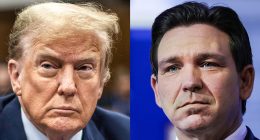
The Biden administration intends to pursue a ban on menthol cigarettes, a policy move that could sweep from the market more than a third of all cigarettes sold in the U.S.
The proposal, announced Thursday by the Food and Drug Administration, stems from the agency’s finding in 2013 that menthols are harder to quit than regular cigarettes and likely pose a greater health risk. The agency also found that menthols are likely associated with increased smoking initiation by young people because the cooling properties of menthol mask the harshness of cigarette smoke.
The FDA had to respond in court by Thursday to a citizens’ petition to ban menthols by disclosing whether the agency intends to pursue such a policy. A nationwide menthol ban would take years to implement, and industry leaders have signaled that they might fight a ban in court.
In addition to the menthol ban, the FDA said it would pursue a ban on all flavors of cigars and cigarillos, which are popular among children and teens. The FDA said Thursday that it aims to publish a proposed rule within the next year. Then, it would likely have to review tens of thousands of comments submitted by manufacturers, consumers, health experts and others before publishing a final rule.
U.S. health officials said the move reflected the Biden administration’s goal of tackling health disparities in marginalized communities.
A menthol ban “will help save lives, particularly among those disproportionately affected by these deadly products,” Acting FDA Commissioner Janet Woodcock said. She said it would reduce youth initiation, increase the odds for smokers looking to quit and address health disparities among people of color, poor people and LGBTQ people, all of whom are more likely to smoke menthols.
The Biden administration also has been considering requiring tobacco companies to reduce the nicotine in all cigarettes sold in the U.S. to levels at which they would no longer be addictive, The Wall Street Journal reported last week. The administration’s deliberations on that idea are still under way, Dr. Woodcock said Thursday.
For tobacco companies, menthols are a crucial segment of the cigarette business. Because menthol smokers skew younger than average, they represent a longer potential lifetime of smoking. And over the past decade, menthols have gained an increasing share of U.S. cigarette sales.
The share of smokers who use menthols has risen continuously, from 30.5% in 2005 to 40.2% in 2019, according to a Journal analysis of data from the National Survey on Drug Use and Health. Some 44% of children ages 12 to 17 who smoke say they use menthols, according to the data.
Menthols are the overwhelming cigarette of choice for Black smokers, and Black people in the U.S. die at higher rates than other groups from smoking-related diseases such as cancer, heart disease and stroke.
In the U.S., 84% of Black smokers and 47% of Hispanic smokers use menthols, compared with 30% of white smokers, according to the National Survey on Drug Use and Health data.
The FDA Thursday pointed to a study suggesting that banning menthol cigarettes in the U.S. would prompt an additional 923,000 smokers to quit, including 230,000 African Americans in the first 13 to 17 months after a ban goes into effect.
Reynolds American Inc. makes Newport, the leading U.S. menthol brand. The company, a subsidiary of British American Tobacco PLC, has disputed the FDA’s conclusions on the health effects of menthols and has argued that a ban would expand the underground market, increasing rather than decreasing teens’ access to cigarettes.
“There is no scientific basis to regulate menthol and non-menthol cigarettes differently,” a Reynolds spokeswoman said Thursday.
Reynolds has funded Black community leaders who have spoken out against municipal menthol bans, arguing that they would create an illicit market and lead police to racially profile Black smokers. The American Civil Liberties Union and some members of the Congressional Black Caucus have expressed similar concerns. The FDA and other proponents of a menthol ban, including the NAACP, have countered that the ban would apply to manufacturers, importers, wholesalers, distributors and retailers—not individual consumers.
“We do not enforce against possession,” Mitch Zeller, director of the FDA’s Center for Tobacco Products, said Thursday on a call with reporters. He added that state and local law enforcement don’t enforce FDA regulations.
The FDA also would work to prevent illicit tobacco products from making their way onto the market, Mr. Zeller said.
Altria Group Inc.’s Marlboro-branded menthols hold the No. 2 spot in the category. Altria over the past several years has pushed to expand its share of the menthol category, launching new products such as Marlboro Ice, Marlboro Bold Ice and Benson & Hedges Menthol.
“Prohibition just doesn’t work,” Altria CEO Billy Gifford said on a call with analysts Thursday. “It’s fraught with unintended consequences.” He said scientific evidence doesn’t support such a ban and argued that a better approach would be a marketplace of less-harmful alternatives authorized by the FDA. Altria also noted that youth smoking rates have fallen to historic lows
Among U.S. adults, smoking rates have declined to 14% in 2019 from 25% in 1995, according to the Centers for Disease Control and Prevention. About 5% of high-school students smoke cigarettes, according to a 2020 federal survey.
The FDA has been considering a menthol ban for more than a decade.
The 2009 Tobacco Control Act gave the FDA regulatory authority over tobacco. That measure prohibited candy, fruit and spice flavorings in cigarettes because of their potential appeal to children, but it left unsettled the issue of menthol. The law said the FDA could prohibit menthols only if it could demonstrate that a ban was a net benefit to public health, taking into account potential unintended consequences such as an illicit market. The agency has been working on overcoming that hurdle since then.
The FDA during the Trump administration took steps toward enacting a menthol ban when Commissioner Scott Gottlieb championed the idea. But the plan was put on hold after he left the agency in 2019.
Menthol, a compound that occurs naturally in mint plants, has been added to cigarettes since the 1920s. It provides a cooling sensation in the mouth and throat, similar to that of a mentholated cough drop. Health officials have said that eases the throat irritation caused by cigarette smoke, making menthols more appealing to young people and those who have never smoked.
—Tom McGinty contributed to this article.
Write to Jennifer Maloney at [email protected]
Copyright ©2020 Dow Jones & Company, Inc. All Rights Reserved. 87990cbe856818d5eddac44c7b1cdeb8








